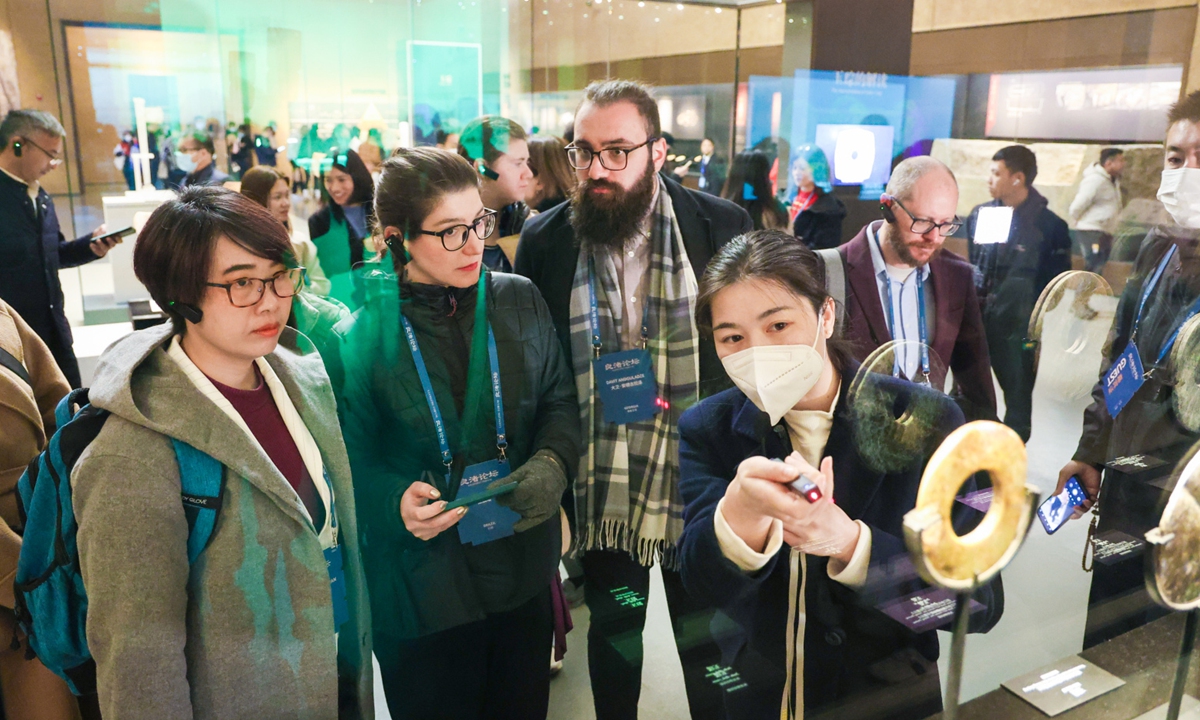
Guests of the Liangzhu Forum explore an exhibition at the Liangzhu Museum in Hangzhou, East China's Zhejiang Province, on December 1, 2023. Photo: Courtesy of the Liangzhu Forum
The main event for the International Day for Monuments and Sites, also known as World Heritage Day, is set to take place at the Liangzhu Ruins in East China's Zhejiang Province on Thursday. Experts said the event is set to promote Global Civilization Initiative and advance cutting-edge research in archaeological site conservation management. It also seeks to explore new pathways for the conservation and utilization of archaeological sites, enhance the management of world cultural heritage protection, and foster international exchanges and cooperation in the field of cultural heritage.
Featuring keynote speeches, academic discussions and exchanges, the main event aims to reaffirm the universal values of cultural heritage. It will also showcase the application of the Venice Charter in China's cultural heritage conservation practices, emphasizing the international community's shared responsibility for heritage protection and exploring the future of cultural heritage conservation efforts, according to a press release from the Liangzhu Ruins on Wednesday.
Themed on "Disasters and Conflicts through the Lens of the Venice Charter," the year of 2024 marks the 60th anniversary of the charter, a chapter that recognizes the importance and role of historical architectural heritage as humanity's common legacy and witnesses to history.
Over the years, the Venice Charter has been a guiding principle for the International Council on Monuments and Sites (ICOMOS) and one of the most important documents in the field of international monument and site conservation, according to the official website of the council.
Archaeologists and experts reaffirmed the significance of the Venice Charter in today's world, which still faces a lot of challenges such as climate change, wars and conflicts.
On Wednesday, the International Council of Museums China Science Committee on Archaeological Heritage Management was established at the Liangzhu Ruins. The organization will help promote the protection of world heritage sites in China as well as mutual learning and cultural exchanges between different civilizations, officials and experts said at the ceremony.
In a pre-recorded video, John Peterson, president of the International Scientific Committee on Archaeological Heritage Management, welcomed the committee to the global system. He highlighted the committee's role in expanding ICOMOS' international influence and increasing the number of people engaged in research in this field.
Song Xinchao, president of the Chinese National Committee for ICOMOS, emphasized the committee's growth and efforts to integrate international concepts with Chinese practices in heritage conservation. He stressed the importance of sharing China's experiences in heritage conservation and management with the world while bringing meaningful heritage conservation experiences from around the world to China.
Wang Shu, director of the Hangzhou Liangzhu Archaeological Administrative District Management Committee, described the Liangzhu Site as a glorious site that embodies over 5,000 years of Chinese civilization. He said the site showcases the charm of Chinese civilization and enriches cultural confidence as a precious treasure for all humanity.
"More and more friends from all over the world have come to this world cultural heritage site to experience the beauty of ancient civilization and modern civilization, and promote the sharing of heritage protection results throughout the entire society," she told the Global Times.
An expert who attended the event surnamed Yao told the Global Times that the protection of the Liangzhu Ruins has achieved great advancement in digitized archaeology with the support of high technology as well as multi-disciplinary cooperation. Additionally, the world heritage site has carried out multiple international exchanges with many countries in the past years, including the UK and Greece.
According to Yao, the organizers are currently actively promoting the cultural potential of the Liangzhu Cultural Corridor and Liangzhu National Cultural Park.
They aim to foster the development through heritage conservation, cultivating pollution-free industries primarily based on cultural creativity, and supporting local efforts in building villages, developing village-level collective economies, and improving social welfare, thereby enhancing local people's sense of achievement and happiness and promoting awareness in protecting the site.
To mark the International Day for Monuments and Sites, various locations across China are also hosting events.
On Tuesday, East China's Shandong Province held a series of events that focus on some representative ancient buildings, with short videos and graphic reports presenting the beauty of ancient buildings in the province.
Moreover, a history and culture exhibition will be held at Beijing's Temple of Agriculture on Thursday, according to the Beijing Municipal Cultural Heritage Bureau. The temple and its surrounding buildings will open to the public for the first time in over 200 years that day to celebrate the International Day for Monuments and Sites.




